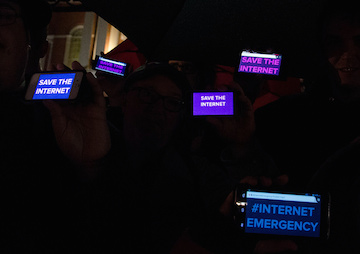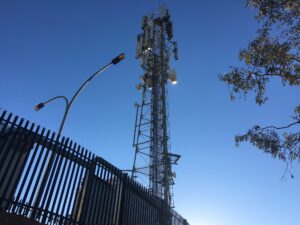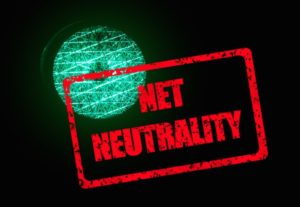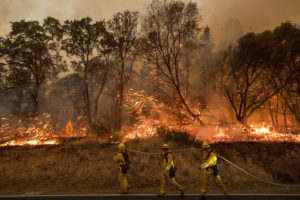New Report Highlights Internet Inequality in Rural Communities
The results of a Harvard University study of stalled Internet upgrades in Western Massachusetts reveal the nation's need for open, impartial Internet access for all. A net neutrality vigil at the Massachusetts State House in 2014. (via Flickr)
A net neutrality vigil at the Massachusetts State House in 2014. (via Flickr)
A net neutrality vigil at the Massachusetts State House in 2014. (via Flickr)
“Would you buy a home without modern-day Internet access?” Susan Crawford asks in an article on Backchannel.com.
Crawford is the co-author — with David Talbot, Waide Warner — of a report analyzing Internet access in rural Massachusetts and demonstrating that rural communities are seriously damaged by their lack of Internet access.
The report, “WiredWest: a Cooperative of Municipalities Forms to Build a Fiber Optic Network,” published Wednesday by Harvard University’s Berkman School for Internet & Society, tells the story of a cooperative of 31 Western Massachusetts towns and the problems that the cooperative faced as it tried to establish “a state-of-the-art fiber optic network”:
The WiredWest cooperative network would connect to an $89.7 million “middle-mile” fiber optic network built by MBI [the Massachusetts Broadband Institute] to connect community institutions such as libraries, schools, hospitals, and government buildings in 45 towns considered “unserved” (because they lack any cable service), plus 79 other towns that had partial or full Internet access services. …
So far 24 of WiredWest’s member towns have authorized borrowing a total of $38 million and most of those towns support going forward as part of WiredWest. Under the plan, they will pay about two-thirds of the network’s costs. To cover the remainder, they will need to receive a portion of $50 million that is available in subsidies. But at the time of this report, MBI had tabled any decision on the project amid a wider review of the last-mile program by the administration of Gov. Charlie Baker.
The lack of high-speed Internet in rural towns is nothing new. According to a 2014 article in High Country News, “Of the 19 million Americans who lack broadband access—defined as 4 megabits per second (mbps) download speed, 1 mbps upload—14.5 million live in rural areas” and “[t]hirty percent of Indians living on reservations also lack access.” This lack of access creates economic and cultural problems: Crawford writes that younger generations move away and business opportunities dwindle. The Massachusetts government’s failure to assist in providing Internet “means the citizens and small businesses of Western Mass won’t have access to the kinds of services—think new customers, better education, better health outcomes—that are routine in areas that have robust fiber networks.”
The problem in Massachusetts is playing out as part of a nationwide debate over Internet access. The Federal Communications Commission (FCC) passed the Open Internet Order last year, officially categorizing broadband as a utility. At the time, the FCC said the move would “ensure that Americans reap the economic, social, and civic benefits of an Open Internet,” but that hasn’t exactly been the case. Wired magazine reported that net neutrality—the principle of open, impartial Internet access for all—still faces resistance, as Republicans in Congress fight to overturn the FCC’s decision:
Last month, presidential candidates Ted Cruz and Marco Rubio, along with six other senators, proposed a bill that would overturn the FCC decision. The legislation, dubbed “The Restoring Internet Freedom Act,” would not only nullify the FCC’s net neutrality rules but prohibit the agency from passing similar rules in the future.
This crucial issue will only become more politicized throughout this election year; a new president could make or break net neutrality. And considering that humanity’s reliance on the Internet continues to grow, rural communities need access to modernization more than ever.
—Posted by Emma Niles
Your support matters…Independent journalism is under threat and overshadowed by heavily funded mainstream media.
You can help level the playing field. Become a member.
Your tax-deductible contribution keeps us digging beneath the headlines to give you thought-provoking, investigative reporting and analysis that unearths what's really happening- without compromise.
Give today to support our courageous, independent journalists.





You need to be a supporter to comment.
There are currently no responses to this article.
Be the first to respond.